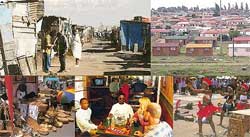
According to the declaration issued at the end of the Gauteng Township Economy Revitalisation Summit, held this week, government will work with research institutions to build a knowledge base about the township economy and develop methodologies for assessing the social and economic impact of township enterprises.
Other commitments made by the summit included working towards quality standards for a township enterprise and promoting awards for township businesses.
The Gauteng Provincial Government held a one-day Summit on Township Economic Revitalisation at Orlando Stadium in Soweto earlier this week. The purpose of the summit was to afford local entrepreneurs, SMMEs and cooperatives an opportunity to contribute towards the Township Economic Revitalisation Strategy.
The township economy includes the taxi industry, bakeries, spaza shops, shebeens, dressmakers and tailers, car repairs and mechanics.
Delegates who attended the summit called for government to develop a detailed programme through the economic cluster to oversee the implementation of the Township Economic Revitalisation Strategy.

One of the resolutions that arose from the summit was that the Gauteng government should establish, within the provincial Department of Economic Development, dedicated capacity for dealing with the local economy
Delegates also called for a high-level inter-government working group to coordinate and monitor the implementation of the Township Economic Revitalisation Strategy.
"The task to revitalise and transform township economies will not be an easy one but our unity of purpose and collective effort will make it achievable," reads the declaration issued at the end of the summit.
Delegates agreed that commitments and decisions made at the summit required close monitoring.
Other resolutions that were taken at the summit include:
Delegates committed themselves to ensuring that by 2030, the township economy should contribute at least 30% to Gauteng's GDP.
SAnews.gov.za is a South African government news service, published by the Government Communication and Information System (GCIS). SAnews.gov.za (formerly BuaNews) was established to provide quick and easy access to articles and feature stories aimed at keeping the public informed about the implementation of government mandates.
Go to: http://www.sanews.gov.za